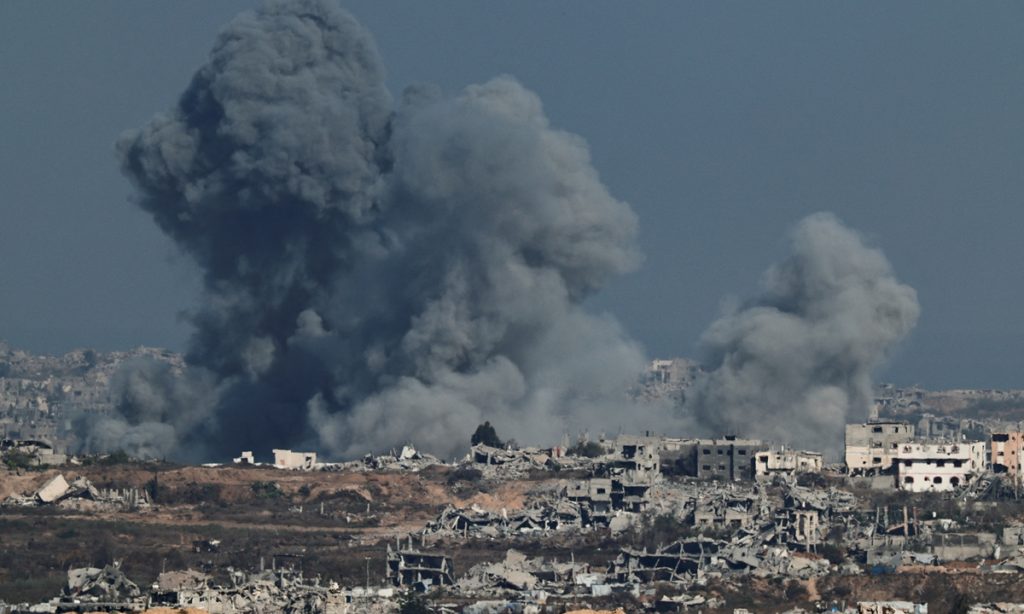First round of indirect Israel-Hamas talks ends inconclusively, 'situation in Gaza likely remains grim for foreseeable future'

The first round of indirect ceasefire talks between Israel and Hamas ended inconclusively in Doha, Qatar, according to multiple media reports on Monday, while Israeli offensives continue in Gaza Strip. Analysts believed that Israel's participation in talks is likely more of a perfunctory response to US pressure, and the situation in Gaza is expected to remain grim for the foreseeable future.
According to the BBC, the session lasted for nearly three and a half hours and took place in two separate buildings in Doha. Messages and clarifications were exchanged between the two sides through Qatari and Egyptian mediators, but no progress was achieved.
"After the first session of indirect negotiations in Doha, the Israeli delegation is not sufficiently authorized ... to reach an agreement with Hamas, as it has no real powers," two Palestinian sources told Reuters.
The specific details of the latest ceasefire proposal have not been made public. According to a copy of ceasefire proposal submitted by mediators to Hamas obtained by The Associated Press ahead of the talks, during the 60-day ceasefire Hamas would hand over 10 living and 18 dead hostages, Israeli forces would withdraw to a buffer zone along Gaza's borders with Israel and Egypt, and significant amounts of aid would be brought in.
The proposal stops short of guaranteeing a permanent end to the war, but states negotiations for a permanent ceasefire would take place during the 60 days, the ABC News reported.
The negotiation took place as Israeli Prime Minister Benjamin Netanyahu headed to Washington for a meeting with US President Donald Trump Monday local time. Netanyahu said he believed his discussions with Trump would help advance talks on a Gaza hostage release and ceasefire deal, as Trump predicted an agreement could be reached this week, Reuters reported on Sunday.
Before departing for Washington, Netanyahu said that Israeli negotiators had clear instructions to pursue a ceasefire agreement under terms already accepted by Israel, Reuters reported.
Israel's participation in ceasefire talks is, to some extent, a perfunctory response to US pressure, according to Liu Zhongmin, a professor at the Middle East Studies Institute of Shanghai International Studies University, in an interview with the Global Times on Monday.
The US aims to limit its engagement in the Middle East to prevent conflict escalation. However, since the latest Palestinian-Israeli conflict erupted in 2023, the US has been constrained by its close ties to Israel, rendering it unable to fundamentally shape or restrain Israel's actions, Liu noted.
Liu pointed out that Israel and Hamas remain deeply divided on core issues. Hamas hopes negotiations will lead to a complete end to the conflict, with Israel halting military operations, withdrawing from Gaza in phases, so as to facilitate a staged hostage exchange. However, Israel appears unwilling to end the conflict. Despite pressure to secure the release of hostages, Israel continues to pursue the complete elimination of Hamas.
The ceasefire talks came as Israeli forces intensified their attacks on Hamas in Gaza. According to Xinhua, Israel killed the head of Hamas' naval force in northern Gaza in an airstrike, citing the military and Shin Bet domestic security agency on Sunday.
The civilian death toll in Gaza is also rising. Citing Civil Defense in Gaza, Xinhua reported that at least 43 Palestinians were killed in Israeli attacks across the Gaza Strip on Sunday.
Since Israel resumed its military campaign in Gaza on March 18, at least 6,860 Palestinians have been killed and 24,220 others injured, bringing the overall death toll in Gaza since the conflict began in October 2023 to 57,418, with a total of 136,261 people injured, according to data released on Sunday by health authorities in Gaza.
In the coming period, even as negotiations proceed, Israel is likely to persist with its military operations in Gaza. Given the limited impact of external mediation, the stark power imbalance between Israel and Hamas, and Israel's increasingly bold and assertive posture following its conflict with Iran, the outlook for peace in Gaza remains deeply uncertain, according to Liu.